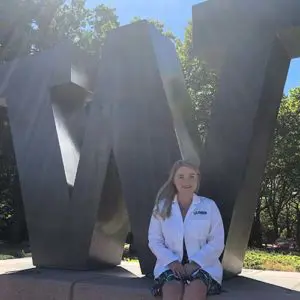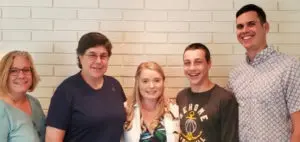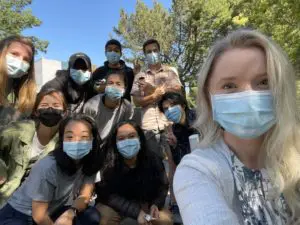The Latin root of “doctor” means “to teach.”
That’s what drew Athena Clemens, a second-year medical student at the UW School of Medicine, to the profession.

Top: Athena’s husband, Michael, assists in donning her white coat on a virtual White Coat Day. Here Athena is at the “big W” on campus after her first day of med school.
“I love sharing knowledge,” Clemens says. “Whatever specialty I go into, I know I’ll work at an academic teaching hospital. I can’t imagine a future where I don’t share my love of learning with the next generation of physicians.
Her path wasn’t always so clear. Although she had an early curiosity and interest in the brain, life had other plans for her. As Clemens neared the end of high school in Colorado, she was juggling a full-time job and a demanding load of Advanced Placement classes.
And, for a while, she was doing it without a home to return to at night.
After a childhood spent in and out of foster care and many experiences with homelessness while with her biological family, Clemens had recently been kicked out of her latest foster home. A friend from school let her stay on his couch, which gave her a sense of safety, but she still felt overwhelmed and alone.
“I had applied for college and scholarships, but I wasn’t getting enough sleep and was just in survival mode,” says Clemens.
Finding family and connection
That’s when Clemens had a challenging conversation with her high school guidance counselor, Trish Neary. “She was fiercely supportive of me wanting to go to college, and she had helped me apply for scholarships,” she says.
Neary asked some hard questions. Didn’t Clemens want to reach her full potential? Of course she did. But she had recently turned 18 and bought a car; she had bills to pay and was starting to think it made more sense to work full-time after high school.
“I left her office crying,” Clemens says.
Soon, due to an urgent family situation, her friend’s family no longer had space on their couch. Neary offered Clemens a housesitting job — and then invited her to move in.

Athena and her chosen family on White Coat day; l to r: chosen parents, Laura-Lee and Trish; Athena; brother, Pierce; and Athena’s husband, Michael.
“I became part of her family, including her partner, Laura-Lee, and their then-seven-year-old son, Pierce,” says Clemens. “They drove me to college in the fall and helped me set up my room, telling me to come home for the holidays. They’ve been my family for a long time now.”
Had Clemens not had that connection, she reflects, many things might have gone wrong. “I was alone in the world,” she says. “If my car broke down, how would my life change? It wasn’t just the initial push from my guidance counselor, but the connection, the family. It’s empowering to feel like even if you fail, your life won’t crumble.”
Still, things weren’t easy. Clemens relied on the help of a scholarship while studying at the University of Colorado. “I wouldn’t have been able to afford it otherwise,” she says. During that time, Neary moved to Bellingham, Washington, and Clemens continued to visit her chosen family when she could.
“Whenever circumstances felt overwhelming and I contemplated giving up, the scholarship organization’s staff encouraged me,” she says.
Making the circle bigger
After applying to medical school, Clemens chose the University of Washington School of Medicine. “It’s a fantastic program and gave me the opportunity to be close to my family. It’s hard to put a price on that,” she says.

Athena with the group of first-year medical students she taught/mentored on physical exam skills as they began their journeys in medicine (entering class of 2021).
But, especially as an out-of-state student, medical school would be the most expensive step on her journey. Clemens carefully figured out how many hours she would need to work and what type of work would allow her to excel in the rigorous program.
The Mesher-Lee Endowed Scholarship and other sources of financial aid changed the equation. Rather than working, Clemens had the freedom to seek out volunteer opportunities. In addition to giving more than 1,000 COVID-19 vaccines, she also mentors underprivileged students who are applying to the School.
“Instead of rushing out to work, I have the incredible opportunity to make the circle bigger by helping more people step into it,” she says.
Clemens found another way to make the circle of support bigger while on the WWAMI multistate education program’s health education track. During her stay in Montana, the WWAMI site took over a foster care clinic from a local health care provider who had recently closed his practice, and she used her life experience to support better health outcomes for kids in foster care.
“I created a training for the department heads about adverse childhood experiences, their impacts on health outcomes down the line and how providers can be supportive in pivoting the trajectory of those experiences and impacts,” she says.
Clemens understands the power of that pivot firsthand. “These scholarships are doing so much more than paying tuition,” she says. “They are nurturing us, tending to all the different facets of our growth in some way or other, embracing us and making us stronger. Really, it’s the sense of people being there to lift you up and catch you that makes me feel like I can keep pushing. One day I’ll be able to lift others in just the same way.”
Written by Alice Skipton
